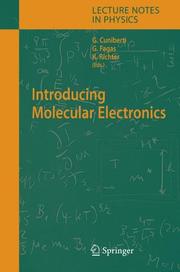| Listing 1 - 5 of 5 |
Sort by
|

ISBN: 3540279946 9783540279945 9786610610464 1280610468 3540315144 Year: 2005 Publisher: Berlin Springer
Abstract | Keywords | Export | Availability | Bookmark
 Loading...
Loading...Choose an application
- Reference Manager
- EndNote
- RefWorks (Direct export to RefWorks)
This volume presents a summary of our current understanding of molecular electronics combined with selected state-of-the-art results at a level accessible to the advanced undergraduate or novice postgraduate. This single book comprises the basic knowledge of both theory and experiment underpinning this rapidly growing field. Concepts and techniques such as density functional theory and charge transport, break junctions and scanning probe microscopy are introduced step-by-step and are subsequently used in specific examples. The text addresses a wide range of systems including molecular junctions made of single-molecules, self-assembled monolayers, carbon nanotubes and DNA.
Electronics --- Molecular electronics --- Electronique moléculaire --- Congresses. --- Congrès --- Physics. --- Plasma (Ionized gases). --- Electronics. --- Nanotechnology. --- Surfaces (Physics). --- Atoms, Molecules, Clusters and Plasmas. --- Surfaces and Interfaces, Thin Films. --- Electronics and Microelectronics, Instrumentation. --- Physics --- Electrical & Computer Engineering --- Physical Sciences & Mathematics --- Engineering & Applied Sciences --- Electrical Engineering --- Electricity & Magnetism --- Atomic Physics --- Microelectronics --- Atoms. --- Microelectronics. --- Materials --- Thin films. --- Atomic, Molecular, Optical and Plasma Physics. --- Surfaces. --- Electrical engineering --- Physical sciences --- Surface chemistry --- Surfaces (Technology) --- Molecular technology --- Nanoscale technology --- High technology --- Materials—Surfaces. --- Microminiature electronic equipment --- Microminiaturization (Electronics) --- Microtechnology --- Semiconductors --- Miniature electronic equipment --- Films, Thin --- Solid film --- Solid state electronics --- Solids --- Coatings --- Thick films --- Natural philosophy --- Philosophy, Natural --- Dynamics --- Chemistry, Physical and theoretical --- Matter --- Stereochemistry --- Constitution --- Surface phenomena --- Friction --- Surfaces (Physics) --- Tribology --- Surfaces
Book
ISBN: 9535130129 9535130110 953514894X Year: 2017 Publisher: IntechOpen
Abstract | Keywords | Export | Availability | Bookmark
 Loading...
Loading...Choose an application
- Reference Manager
- EndNote
- RefWorks (Direct export to RefWorks)
In a previous volume (ICT-Energy-Concepts Towards Zero-Power ICT; referenced below as Vol. 1), we addressed some of the fundamentals related to bridging the gap between the amount of energy required to operate portable/mobile ICT systems and the amount of energy available from ambient sources. The only viable solution appears to be to attack the gap from both sides, i.e. to reduce the amount of energy dissipated during computation and to improve the efficiency in energy-harvesting technologies. In this book, we build on those concepts and continue the discussion on energy efficiency and sustainability by addressing the minimisation of energy consumption at different levels across the ICT system stack, from hardware to software, as well as discussing energy consumption issues in high-performance computing (HPC), data centres and communication in sensor networks.
This book was realised thanks to the contribution of the project ‘Coordinating Research Efforts of the ICT-Energy Community’ funded from the European Union under the Future and Emerging Technologies (FET) area of the Seventh Framework Programme for Research and Technological Development (grant agreement n. 611004).
Information technology. --- IT (Information technology) --- Technology --- Telematics --- Information superhighway --- Knowledge management --- Engineering --- Physical Sciences --- Engineering and Technology --- Energy Engineering --- Sustainability Science
Digital
ISBN: 9783540315148 Year: 2005 Publisher: Berlin, Heidelberg Springer
Abstract | Keywords | Export | Availability | Bookmark
 Loading...
Loading...Choose an application
- Reference Manager
- EndNote
- RefWorks (Direct export to RefWorks)
Plasma physics --- Atomic physics --- Solid state physics --- Electronics --- Electrical engineering --- plasmafysica --- nanotechniek --- elektronica --- fysica
Book
ISBN: 9535163582 953511218X Year: 2014 Publisher: IntechOpen
Abstract | Keywords | Export | Availability | Bookmark
 Loading...
Loading...Choose an application
- Reference Manager
- EndNote
- RefWorks (Direct export to RefWorks)
A sustainable future for our information society relies on bridging the gap between the energy required to operate portable ICT devices with the energy available from portable/mobile sources. The only viable solution is attacking the gap from both sides, i.e. to reduce the amount of energy dissipated during computation and to improve the efficiency in energy harvesting technologies. This requires deeper and broader knowledge of fundamental processes and thorough understanding of how they apply to materials and engineering at the nanoscale, all the way up to the design of energy-efficient electronics. This textbook is a first attempt to discuss such concepts towards Zero-Power ICT. The content is accessible to advanced undergraduates and early year researchers fascinated by this topic.
The book is realized through the EU-funded ZEROPOWER project.
Electrical engineering. --- Electric engineering --- Engineering --- Physical Sciences --- Engineering and Technology --- Energy Engineering --- Power Engineering
Book
ISBN: 9783540315148 Year: 2005 Publisher: Berlin Heidelberg Springer Berlin Heidelberg
Abstract | Keywords | Export | Availability | Bookmark
 Loading...
Loading...Choose an application
- Reference Manager
- EndNote
- RefWorks (Direct export to RefWorks)
This volume presents a summary of our current understanding of molecular electronics combined with selected state-of-the-art results at a level accessible to the advanced undergraduate or novice postgraduate. This single book comprises the basic knowledge of both theory and experiment underpinning this rapidly growing field. Concepts and techniques such as density functional theory and charge transport, break junctions and scanning probe microscopy are introduced step-by-step and are subsequently used in specific examples. The text addresses a wide range of systems including molecular junctions made of single-molecules, self-assembled monolayers, carbon nanotubes and DNA.
Plasma physics --- Atomic physics --- Solid state physics --- Electronics --- Electrical engineering --- plasmafysica --- nanotechniek --- elektronica --- fysica
| Listing 1 - 5 of 5 |
Sort by
|

 Search
Search Feedback
Feedback About UniCat
About UniCat  Help
Help News
News